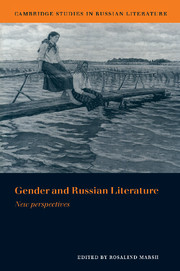Book contents
- Frontmatter
- Contents
- Notes on contributors
- Acknowledgements
- 1 Introduction: new perspectives on women and gender in Russian literature
- PART I HISTORICAL AND BIOGRAPHICAL PERSPECTIVES
- 2 Women in seventeenth-century Russian literature
- 3 Conflicts over gender and status in early nineteenth-century Russian literature: the case of Anna Bunina and her poem Padenie Faetona
- 4 Reading the future: women and fortune-telling in Russia (1770–1840)
- 5 Russian women writers of the nineteenth century
- 6 The ‘woman question’ of the 1860s, and the ambiguity of the ‘learned woman’
- 7 Carving out a career: women prose writers, 1885–1917, the biographical background
- 8 The fate of women writers in literature at the beginning of the twentieth century: ‘A. Mirè’, Anna Mar, Lidiia Zinov′eva-Annibal
- 9 Lidiia Zinov′eva-Annibal's The Singing Ass: a woman's view of men and Eros
- 10 Anastasiia Verbitskaia reconsidered
- 11 Soviet woman of the 1980s: self-portrait in poetry
- PART II THE PERSPECTIVE OF LITERARY CRITICISM
- Index
- CAMBRIDGE STUDIES IN RUSSIAN LITERATURE
6 - The ‘woman question’ of the 1860s, and the ambiguity of the ‘learned woman’
Published online by Cambridge University Press: 06 July 2010
- Frontmatter
- Contents
- Notes on contributors
- Acknowledgements
- 1 Introduction: new perspectives on women and gender in Russian literature
- PART I HISTORICAL AND BIOGRAPHICAL PERSPECTIVES
- 2 Women in seventeenth-century Russian literature
- 3 Conflicts over gender and status in early nineteenth-century Russian literature: the case of Anna Bunina and her poem Padenie Faetona
- 4 Reading the future: women and fortune-telling in Russia (1770–1840)
- 5 Russian women writers of the nineteenth century
- 6 The ‘woman question’ of the 1860s, and the ambiguity of the ‘learned woman’
- 7 Carving out a career: women prose writers, 1885–1917, the biographical background
- 8 The fate of women writers in literature at the beginning of the twentieth century: ‘A. Mirè’, Anna Mar, Lidiia Zinov′eva-Annibal
- 9 Lidiia Zinov′eva-Annibal's The Singing Ass: a woman's view of men and Eros
- 10 Anastasiia Verbitskaia reconsidered
- 11 Soviet woman of the 1980s: self-portrait in poetry
- PART II THE PERSPECTIVE OF LITERARY CRITICISM
- Index
- CAMBRIDGE STUDIES IN RUSSIAN LITERATURE
Summary
Nikolai Shelgunov, one of the ‘progressives’ of the 1860s, wrote in his article ‘The soullessness of women’ (1870): ‘Which of our women writers – and we have a fair number of them – has studied the woman question and written about it? Not one. Is this not grim evidence of women's lack of resolve, of women's hereditary passivity?' This opinion seems strange, not least because its writer is known as a ‘radical’ literary critic who was able to monitor at first hand the history of the ‘woman question’ (zhenskii vopros). It does, however, demonstrate the ambiguity of women's opportunities to participate in the discourse of the ‘woman question’.
The contradictory nature of the ‘woman question’ of the 1860s becomes apparent through comparison with the opening decades of the century or with the fin de siècle. The paradigmatic breakthroughs of the 1820s and 1830s and also those of the turn of the century are characterized by the gradual rise to prominence of women's culture, notably in the diversity of their literature. What, then, were the opportunities for women's writing in the 1860s, characterized as it was by a forceful discourse on gender equality, on the ‘woman question’? Why did Shelgunov fail to acknowledge the contribution of women writers? I pose the question in order to challenge the assumption that establishing an egalitarian gender model of the period enhanced women's ability to transfigure the visions of their knowledge in a manner adequate to their cultural experience.
- Type
- Chapter
- Information
- Gender and Russian LiteratureNew Perspectives, pp. 112 - 128Publisher: Cambridge University PressPrint publication year: 1996

